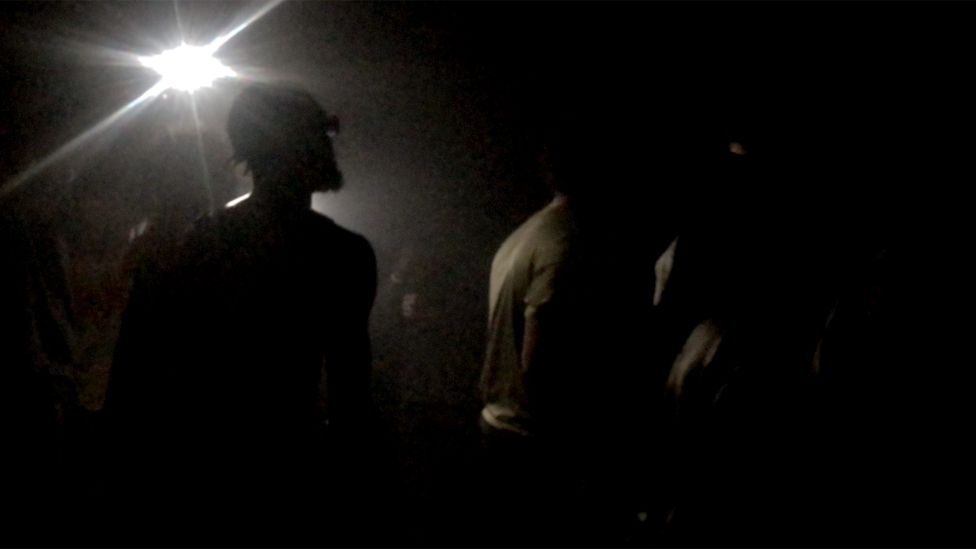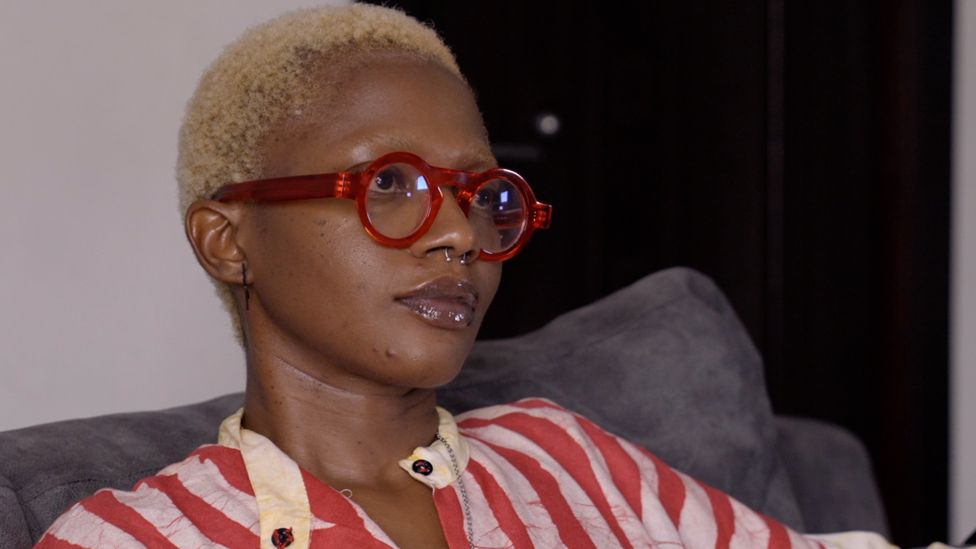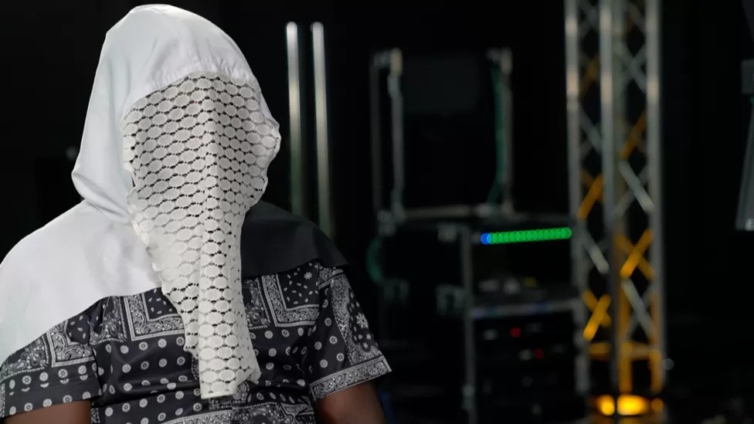When Nigeria passed some of the toughest anti-homosexuality laws in Africa, the internet became a place for the LGBT community to connect with others more safely - until criminal gangs went digital too. BBC Africa Eye investigates how blackmailers pose as potential dates on popular dating apps, only to extort, beat and even kidnap people.
Warning: This article contains a reference to suicide
Living life in secret as a gay man in Nigeria was dangerous for Mohammed.
He was always careful when he planned to see someone - but one arrangement shattered his life forever.
The father of three met Jamal online. They had been chatting for some time when he finally decided to see him in person. He said he had grown fond of him, even trusted him, and so one afternoon he met Jamal in town and went back to his place.
But it was a trap.
Mohammed was about to get in the shower but once he had taken off his clothes, a group of men burst in and started beating him and demanding money.
Jamal and the gang made a video of him, naked, begging them to let him go.
"I couldn't believe that someone I trusted could go to the extent of doing that to me."
When the video went online, Mohammed said his life fell apart.
He had kept his sexuality to himself - outwardly he was a married man raising a family.
'My son saved me'
Speaking with a white hood pulled over his head and a mask to conceal his identity, he agreed to talk to the BBC as long as his anonymity was guaranteed.
"I was crying. I wanted to kill myself."
He described the moment when a phone call to his son saved him from ending it all.
"I called my kids, three of them. My son told me he loves his father. Even if his father is queer, he has no issues with that.
"He gave me a reason why I should not [kill myself]."
Mohammed broke down at this point, wrenched off the white hood, got up, hid his face and began to cry. Reliving what happened to him was just too painful.
According to a group of activists who work with the LGBT community in Nigeria, around 15 to 20 people contact them each week with similar stories to Mohammed.
This type of blackmail, where an LGBT person is entrapped, is known in Nigeria's gay community as "kito" - the exact origin of the term is unclear. BBC Africa Eye interviewed 21 people in all about their experiences of being "kito'd".

Emmanuel, not his real name, described how he started chatting to a friend online, but had not realised his friend's account had been hijacked. When he arranged to meet up with him, he was ambushed by a gang of around five men.
"They made a video of me, and they were asking weird questions. They said: 'What's the name of the school you attend? Where are you from? What's the name of your parents?' I knew they were going to use that video to blackmail me. So I also gave them wrong information."
The gang did not post the video online, but they forced him to withdraw 500,000 naira ($1,000; £860) from his accounts and tortured him with an iron.
He lifts his hand to show the scar that remains at the base of his thumb from the attack. After sharing out the money between them, the gang let him go.
"It hurt me mentally. I don't trust anybody. I just feel insecure."
In 2014, the Same-Sex Marriage (Prohibition) Act became law in Nigeria, and a new 14-year prison sentence was introduced for anyone caught entering into a same-sex marriage contract or civil union.
It also criminalised public displays of affection between same-sex couples, imposing a 10-year prison sentence on those who "directly or indirectly make [a] public show of [a] same-sex amorous relationship".
It banned gay clubs, introducing a 10-year prison sentence for anyone who registers, operates, or participates in gay clubs, societies, and organisations, including supporters of those groups.
The passing of the law had widespread support, according to surveys, and meant Nigeria had some of the strictest laws against homosexuality in Africa. The 12 northern states could already sentence people to death under Sharia, or Islamic law, for engaging in homosexual acts.
The new law, according to a report by Human Rights Watch "officially authorised abuses against LGBT people, effectively making a bad situation worse".
In 2014, media reports of violence, mob justice and extortion against LGBT people were common and activists say there has since been an explosion in kito cases since then.

Filmmaker Uyaiedu Ikpe-Etim, who lives openly as a gay woman in Nigeria, said blackmail against LGBT people is "rampant".
"Every other day there's a story on the internet. Sometimes we have the stories where a person has been lynched to death.
"And it's the reactions from the other Nigerians. It's almost celebratory. 'Oh great, good, they kill them. They should not be allowed to come out.' And there's just no justice."
Ms Etim said what makes it even harder is that the victims feel they cannot go to the police out of fear of being arrested or even attacked.
"It's just sad, you know."
She said the gay community, which is forced to live online, has to be careful there too.
"We don't have a heterosexual privilege to walk up to a person in the streets or in a restaurant and be like: 'Can I have your number?'"
However, some law enforcement officials are working with activists to stop the blackmailers.
BBC Africa Eye spoke to an officer with the Nigeria Security and Civil Defence Corps (NSCDC). He works alongside a team of activists who pose online as LGBT people looking to meet a potential partner. The aim is to trick the blackmailers.
"For me, there's nobody that is above law in the country. Blackmailing is a very bad offence. It's a very big crime," he said, speaking to the BBC on condition of anonymity.
"If anybody brings a case to my table concerning any case of blackmailing of a gay person, I will hunt for them. Definitely."
The victims contact the team of activists with the blackmailers' names and photos. They in turn send the information to the NSCDC, which begins the process of snaring the criminals.
"Wherever they are, I want to tell them there is no hiding place for blackmailers in Nigeria."
The problem they face is persuading victims to testify in court. In a country where being gay may send you to jail, few people would stand up and be honest about their sexuality.
It means the blackmailers are rarely prosecuted.
And there is little solace for the victims.
Many of the people BBC Africa Eye interviewed had lost their jobs since the blackmail videos went online. Some had been evicted from their homes, others estranged from their families. All of them were struggling with their mental health.
For Mohammed, who had even considered ending his own life, there remains a sense of shame as the film of him has stayed online.
"I know they are still watching the video," he said.
Latest Stories
-
Video: Hitz FM’s Rep Ur Jersey ends in style as fans jam to afterparty beats
1 hour -
Hitz FM’s Rep Ur Jersey turns electric as PSG thrashes Inter 5–0 in Champions League showdown
1 hour -
PSG thrash Inter Milan to win first-ever Champions League title
1 hour -
Aviation Social Centre packed as UCL Finale kicks off at Hitz FM’s Rep Ur Jersey
3 hours -
Photos: Fans win big at ‘Rep Ur Jersey’ as sponsors reward game participants with exciting prizes
3 hours -
Australia to increase contribution to UN Peacebuilding Fund to $15m annually – High Commissioner
3 hours -
Dr. Angela Dwamena-Aboagye named MTN Hero of Change for championing women and children’s rights
3 hours -
From Morocco to Botswana – Africans turn to trusted media and experts for climate change information
4 hours -
Mahama announces Labour Export Programme
4 hours -
Prof. Peter Atudiwe Atupare appointed Dean of University of Ghana School of Law
4 hours -
Goldbod is already doing wonders – Mahama praises CEO Sammy Gyamfi
5 hours -
Mahama promises attractive cocoa price in August, pledges 200,000 hectare boost to sector
5 hours -
UHAS Council Chairman Prof. Kodzo Gavua urges graduates to serve with passion, integrity, and innovation
6 hours -
Dr. Charisa Ogbogbo becomes first female professor in Mathematical Sciences at UG
6 hours -
Communication Ministry assures data price cuts as TELCOS prepare to reduce costs soon
7 hours

